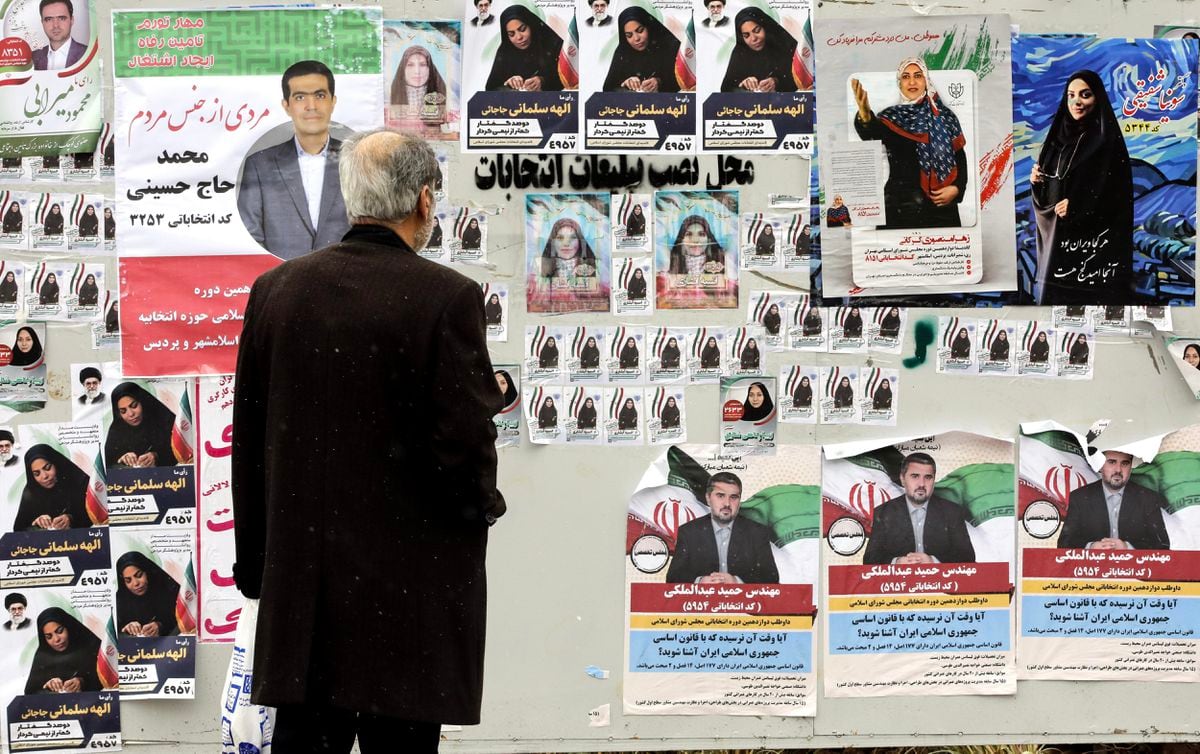Iran returns to the polls on March 1.
Like every four years, the authorities organize new legislative elections in the face of growing apathy among citizens.
Few believe in elections that offer no real alternative.
Not even the coincidence with the renewal of the Assembly of Experts, a conclave that during its eight years of mandate is likely to have to elect a new supreme leader (the current one, Ayatollah Ali Khamenei, is 84 years old), constitutes an incentive for reverse the abstention that unleashed the crushing of the reform movement starting in 2009.
That date marked a before and after in the Islamic Republic.
Many Iranians considered President Mahmoud Ahmadinejad's reelection against a candidate, Hossein Mousavi, much more popular among young people, fraudulent.
But the brake on the reform aspirations of the generations that did not live through the 1979 revolution began several years before.
It was during the Government of Mohamed Khatami, whose timid gestures of opening neutralized the true power of Iran: the alliance between the supreme leader and the military of the Revolutionary Guard.
During the almost three decades that I covered the different Iranian elections (presidential, legislative, municipal) I witnessed a gradual disillusionment of citizens with a process that not only ignores their desires for change, but no longer even offers them options.
The system is responsible for limiting any possibility that does not fit the parameters of power through a series of parallel institutions such as the Council of Guardians, which has the right to veto the candidates and also over the laws that Parliament eventually approves ( Majles).
Thus, their “Islamic democracy” remains a mere shell empty of content.
It is not just that the requirements demanded of candidates for deputies include being a practicing Muslim (except for the five seats reserved for religious minorities) or supporting the Islamic Republic.
The court made up of the 12 jurists of the Guardian Council (half of them religious, appointed by the supreme leader) decides at its discretion their ideological and moral suitability.
Take Tehran as an example.
The province that houses the Iranian capital, a conurbation of 15 million inhabitants, elects 30 deputies.
Official spokespersons are full of mouths announcing that almost 3,900 candidates are presenting themselves, three times more than in 2020. But this overabundance of names is far from offering true alternatives.
Most of the reformist and moderate candidates have been vetoed.
In fact, former president Hasan Rohani, hardly suspected of being anti-system although less dogmatic than the current rulers, has not been able to form a complete list of the approved members of his political group (there are no real parties in Iran).
Meanwhile, the Reform Front, which brings together around twenty reformist organizations, will not even attend and has denounced that the call is “neither competitive, nor free, nor fair.”
The ultras, who have controlled Parliament for the last two decades and held 232 seats (out of a total of 290) in the outgoing Chamber, do not want to risk losing a shred of power.
However, the protests that have taken place in recent years have made clear the discontent of a considerable part of the population, whether women, young people, precarious workers or the unemployed.
Not even in the Assembly of Experts, a naturally more conservative fiefdom due to its religious nature, do they have it all together.
The Guardian Council has vetoed Rohani, who was seeking re-election.
And the current Iranian president, the ultraconservative Ebrahim Raisí, has avoided running for Tehran and has opted for a small rural district in which he has remained the only candidate after the withdrawal of a possible rival and the disqualification of the rest.
Why do they call elections then?
Why maintain fiction?
The rulers of the Islamic Republic continue to seek legitimacy in the vote as a result of the dual nature, republican and theocratic, of their regime.
But the political project, which in 1979 was a novel proposal against the tyranny of the shah, has become another form of despotism 45 years later.
This is how the Iranians understand it.
Only 30% of potential voters intend to vote, according to data from the Ministry of the Interior.
If confirmed, it will be the worst result in its history.
Follow all the international information on
and
X
, or in
our weekly newsletter
.
Subscribe to continue reading
Read without limits
Keep reading
I am already a subscriber
_

